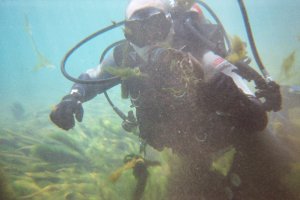 Dr. Ryan Earley specializes in integrative animal behavior, with particular emphasis on fishes that inhabit some of the most fascinating (and challenging) ecosystems on the planet. He fuses field-based research on the ecology of these fishes with rigorous laboratory experimentation on the mechanisms – from genes and hormones to neural circuits – that drive phenotypic variation.
Dr. Ryan Earley specializes in integrative animal behavior, with particular emphasis on fishes that inhabit some of the most fascinating (and challenging) ecosystems on the planet. He fuses field-based research on the ecology of these fishes with rigorous laboratory experimentation on the mechanisms – from genes and hormones to neural circuits – that drive phenotypic variation.
In March 2010, Dr. Earley and several of his students donned their SCUBA gear to survey the impact of predation pressure and breeding status on the vibrant color patterns of female cichlid fishes in the volcanic lakes of Nicaragua. They followed this with two expeditions (April and August 2010) to the mangrove ecosystems of the Florida Keys, where they navigated a labyrinth of roots and crab burrows in search of the elusive mangrove rivulus – a fish that naturally ‘clones’ itself. In the laboratory, Earley and his research team transform into endocrinologists and molecular biologists to explore the hormonal, genetic, and neural mechanisms responsible for generating behavioral diversity.
Find out more about Dr. Earley’s research at the Integrative Animal Behavior Website.